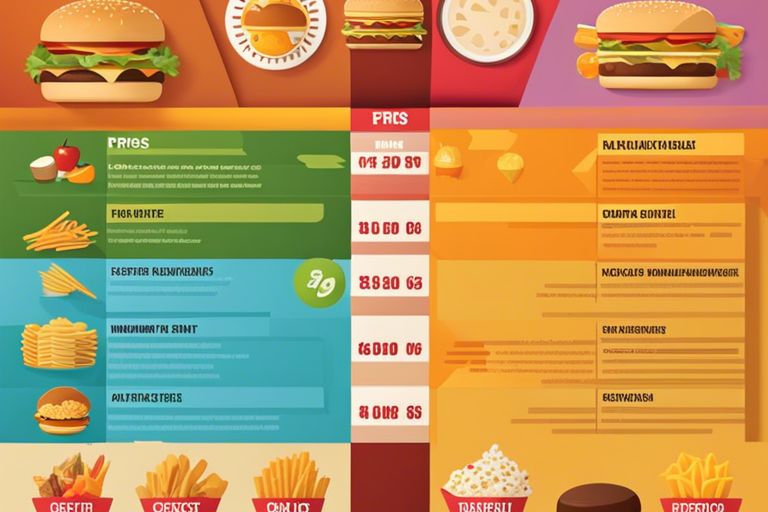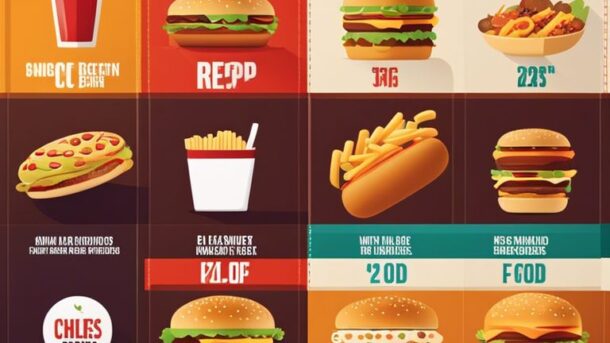With the convenience and affordability of fast food, it may be tempting to indulge in it daily. However, have you ever stopped to consider the long-term effects on your health and well-being? In this blog post, we will probe into the pros and cons of consuming fast food every day, exploring how it can impact your overall health and offering tips for making more informed choices about your daily diet.
Key Takeaways:
- Limit Consumption: Fast food should not be consumed every day due to its high levels of unhealthy fats, sugars, and sodium.
- Nutritional Deficiencies: Eating fast food regularly can lead to nutritional deficiencies in important vitamins, minerals, and fiber that are crucial for good health.
- Health Risks: Regular consumption of fast food has been linked to various health risks including obesity, heart diseases, diabetes, and high blood pressure. It is important to maintain a balanced diet by including a variety of nutrient-rich foods in one’s daily meals.

The Convenience Factor
Before exploring into whether fast food is good to have every day, it’s imperative to consider the convenience factor that draws many people towards it. Fast food is all about saving time in a busy world, offering quick and easy meal options for those on the go.
Saving Time in a Busy World
Saving time is crucial in today’s fast-paced society, where schedules are packed, and time is a precious commodity. Fast food establishments provide a convenient solution for those days when you’re swamped with work, errands, or other responsibilities. Instead of spending hours shopping for ingredients, preparing a meal, and cleaning up afterward, you can grab a quick bite to eat at a fast-food restaurant and continue with your day.
The Ease of Accessibility
Factor in the ease of accessibility that fast food offers, with drive-thru options available in most locations, making it a go-to choice for many busy individuals. For instance, when you’re running late for a meeting or stuck in traffic, being able to quickly swing by a fast-food joint and grab a meal without leaving your car can be a lifesaver. The convenience of fast food extends beyond just saving time; it’s also about being readily available when you need it most.
Nutritional Value
The High Calorie and Fat Content
Even though fast food may be convenient and tasty, it often lacks the nutritional value that your body needs to function at its best. For example, fast food is typically high in calories and saturated fats, which can contribute to weight gain and increase your risk of developing health issues like heart disease and diabetes.
Lack of Essential Vitamins and Minerals
High consumption of fast food can lead to a lack of vital vitamins and minerals in your diet. This is because fast food often lacks sufficient amounts of fruits, vegetables, and whole grains, which are important sources of vitamins, minerals, and dietary fiber that your body needs to stay healthy.
Plus, the cooking methods used in fast food preparation, such as deep-frying, can lead to a loss of nutrients in the food. This means that even if you are consuming some vitamins and minerals from fast food, they may not be as beneficial to your body due to the cooking process.
The Impact on Overall Health
ValueEven though fast food may be convenient and budget-friendly, it can have a significant impact on your overall health. Consuming fast food regularly can lead to weight gain, high cholesterol, high blood pressure, and an increased risk of chronic diseases. This can have long-term consequences on your health and well-being.
Understanding the nutritional value of the food you eat is vital for maintaining a healthy lifestyle. By choosing whole, nutrient-dense foods over fast food options, you can ensure that you are providing your body with the necessary vitamins, minerals, and nutrients it needs to thrive.

The Psychological Aspect
Emotional Eating and Fast Food
For an in-depth look at how fast food affects your body, you can read about Fast Food’s Effects on 8 Areas of the Body. Emotional eating is a common phenomenon where individuals use food as a coping mechanism for stress, sadness, or other emotions. Fast food, with its convenience and affordability, can easily become a go-to choice during times of emotional distress. However, these foods are often high in sugar, fat, and salt, which may provide a temporary feeling of comfort but can lead to negative impacts on your overall well-being in the long run.
The Role of Advertising in Shaping Our Choices
Fast food companies invest significant resources in advertising to create a strong allure around their products. These advertisements often portray fast food as tasty, fun, and a source of happiness. Marketing strategies target your emotions and desires, making you more likely to crave and choose fast food options over healthier alternatives. The constant exposure to these persuasive messages can subconsciously influence your food choices and behaviors.
Another aspect of advertising’s role in shaping our choices is the way it normalizes fast food consumption. Through strategic placements in movies, TV shows, and social media, fast food becomes ingrained in popular culture as a convenient and enjoyable option for meals and snacks. This normalization can make it challenging to resist the temptation of fast food, especially when surrounded by societal cues that suggest it is the norm.
The Social Pressure to Conform
Choices regarding food are often influenced by social pressures to conform to certain norms or expectations. When everyone around you is indulging in fast food without giving much thought to its health implications, you may feel compelled to do the same to fit in. The fear of standing out or being judged for making healthier choices can push you towards opting for fast food even when you know it’s not the best decision for your well-being.
Psychological factors, such as emotional eating, the impact of advertising, and social pressures, play a significant role in how we perceive and consume fast food on a regular basis. Being aware of these influences can help you make more conscious choices that align with your health goals and overall happiness.
The Environmental Impact
After exploring the nutritional implications of consuming fast food every day, it’s time to explore into the environmental impact it has. Fast food chains are notorious for their excessive use of packaging, leading to a significant amount of waste that ends up in landfills and oceans.
Packaging Waste and Its Consequences
With the convenience of fast food comes a hidden cost – packaging waste. From plastic containers to paper wrappers, the sheer volume of packaging used for one meal is astonishing. Unfortunately, much of this packaging is not biodegradable and adds to the growing pollution crisis our planet is facing. The consequences of this packaging waste are dire, with marine life often mistaking plastic for food, leading to ecosystem imbalances and harm to wildlife.
The Carbon Footprint of Fast Food Production
Packaging isn’t the only environmental concern when it comes to fast food. The carbon footprint of fast food production is substantial, with the industrial farming of livestock being a significant contributor to greenhouse gas emissions. The transportation of ingredients and the energy-intensive processes involved in mass-producing fast food also add to this carbon footprint.
Understanding the carbon footprint of fast food production is necessary in realizing the environmental impact of your daily food choices. By opting for fast food every day, you are unknowingly contributing to the acceleration of climate change and environmental degradation.
Sustainable Alternatives to Traditional Fast Food
One way to mitigate the environmental impact of fast food is to explore sustainable alternatives. Choosing food options that prioritize locally sourced, organic ingredients can significantly reduce the carbon footprint associated with your meals. Additionally, supporting eateries that use eco-friendly packaging and practices can help minimize waste and promote sustainability in the food industry.
Fast food doesn’t have to be synonymous with environmental harm. By making conscious choices and opting for sustainable alternatives, you can enjoy the convenience of fast food without compromising the health of our planet.
The Economic Perspective
The Cost of Fast Food on a Daily Basis
Your daily consumption of fast food may seem convenient and affordable, but have you considered the long-term costs it incurs on your health and wallet? While fast food chains offer quick and cheap options, frequent indulgence can lead to health issues like obesity, heart disease, and diabetes, resulting in hefty medical bills down the road. Additionally, the seemingly low upfront cost of fast food meals may add up over time, draining your financial resources.
The Impact on Local Economies and Small Businesses
Perspective is key when evaluating the impact of fast food on local economies and small businesses. While multinational fast food chains may create jobs and contribute to the economy, they often overshadow smaller, local eateries that struggle to compete. This shift towards large fast food corporations can lead to a homogenized dining culture, erasing the unique flavors and experiences that small businesses bring to communities.
Small businesses are the lifeblood of local economies, adding character and diversity to neighborhoods. By supporting these establishments over fast food chains, you not only preserve the charm of your community but also help sustain the livelihoods of independent entrepreneurs.
The Role of Government Subsidies in the Fast Food Industry
To understand the full picture of the fast food industry, it’s imperative to probe into the role of government subsidies. These subsidies, often provided to agriculture sectors that produce key ingredients for fast food, can artificially lower the cost of production for big fast food chains. This, in turn, perpetuates the cycle of cheap, unhealthy food options dominating the market, influencing consumer choices and fueling the demand for fast food.
In considering the impact of government subsidies on the fast food industry, one must reflect on how these policies shape our food landscape and influence our daily dietary decisions. By recognizing the role of subsidies in promoting certain food industries, you can make more informed choices about the foods you consume and support businesses that align with your values.
The Social Consequences
The Normalization of Unhealthy Eating Habits
Not all habits are beneficial. When fast food becomes a daily choice, it can lead to the normalization of unhealthy eating habits. The convenience and affordability of fast food may make it tempting to rely on it frequently, but this can contribute to poor dietary choices and overconsumption of calories, fats, and sugars.
The Influence on Children’s Eating Habits
To influence a child’s development is to shape their future. The exposure to fast food from a young age can have a lasting impact on children’s eating habits. When fast food is regularly consumed in childhood, it can create a preference for processed and unhealthy foods, setting the stage for potential health issues later in life.
The influence of fast food marketing targeted at children through toys, colorful packaging, and appealing mascots can further solidify these unhealthy eating habits. This can lead to a cycle of poor nutrition that not only affects the child’s health but also their relationship with food as they grow.
The Impact on Community Health and Well-being
Plus, communities are not immune to the effects of widespread fast food consumption. The prevalence of fast food restaurants in neighborhoods can contribute to a decline in community health and well-being. When fast food becomes a staple in the local food environment, it can lead to higher rates of obesity, diabetes, and other diet-related diseases among residents.
Habits formed within a community can influence the health outcomes of its members. The accessibility and affordability of fast food compared to healthier options can perpetuate poor dietary choices, affecting the overall well-being of the community as a whole.
Understanding the Importance of Balanced Nutrition
Understanding the social consequences of relying on fast food as a daily dietary option is crucial. By acknowledging the normalization of unhealthy eating habits, the influence on children’s developing food preferences, and the impact on community health and well-being, you can make more informed choices about your food consumption. Balanced nutrition is key to maintaining your health and the well-being of those around you.
To wrap up
Considering all points discussed in this article, it is evident that consuming fast food every day may not be the healthiest choice for your overall well-being. While it may be convenient and satisfying in the short term, the long-term consequences on your health, weight, and energy levels can be significant. It’s important to prioritize nutritious, balanced meals for your daily diet to maintain a healthy lifestyle.
Do not forget, moderation is key when it comes to fast food. Enjoy it occasionally as a treat, but be mindful of the potential negative effects it can have on your body if consumed regularly. Your health is a valuable asset, so make informed choices about the foods you consume to ensure a happy and healthy future.
Q: Is it healthy to eat fast food everyday?
A: Consuming fast food on a daily basis can lead to health problems such as obesity, high blood pressure, and heart disease due to its high levels of unhealthy fats, sugars, and sodium.
Q: Can fast food be a part of a balanced diet if eaten occasionally?
A: Yes, fast food can be enjoyed in moderation as part of a balanced diet. It is important to choose healthier options, such as grilled chicken sandwiches or salads, and to balance fast food with nutrient-dense foods like fruits, vegetables, and whole grains.
Q: What are some tips for making healthier choices at fast food restaurants?
A: To make healthier choices at fast food restaurants, opt for grilled or baked items instead of fried, choose water or unsweetened beverages instead of sugary drinks, and include more vegetables by swapping fries for a side salad. It’s also helpful to check the nutritional information provided by the restaurant and to avoid super-sized or extra-large portions.



